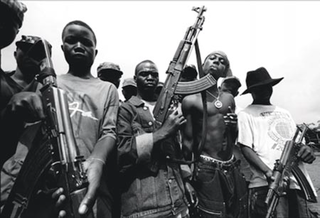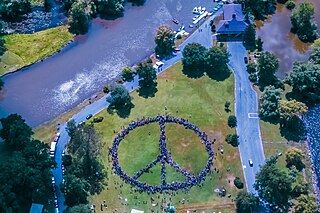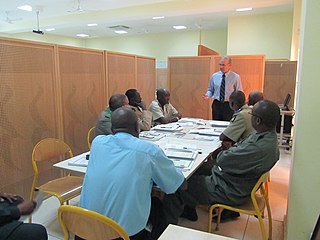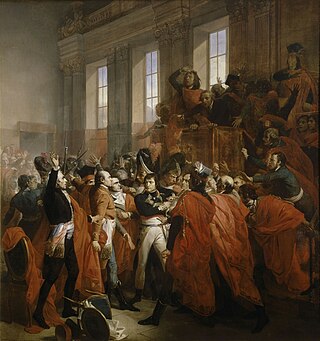This article needs additional citations for verification .(April 2017) |
Conflict trap is a term to describe the pattern when civil wars repeat themselves.
This article needs additional citations for verification .(April 2017) |
Conflict trap is a term to describe the pattern when civil wars repeat themselves.
Scholars have offered a few reasons for it, after Paul Collier and Nicholas Sambanis (2002) noticed a pattern and coined the term ‘conflict trap’. [1] Firstly, a civil war can aggravate the causal political and economic conditions which lead to a repeat civil war. Other reasons can be because the combatants are fighting over stakes that are valuable to both parties, combatants are unable to defeat each other or are engaged in a serious war of long duration. [2]
Political and legal institutions play an important role in inhibiting repeat civil wars, and thus preventing a country from entering a conflict trap. Strong institutions can put checks on the incumbent's power, hence ensuring public welfare, which means rebels have fewer reasons to restart a civil war, and which removes the need for the rebels to maintain an army or a threat of war. Strong political and legal systems also give a non-violent platform to rebels to bring about desired changes, so they may not feel a need to adopt violent ways of protest.
There can be other reasons why a civil war may start and repeat itself. There may be intense grievances held by the groups, which motivate them to fight. Inferior health conditions, lower GDP, and poor human development create conditions for dissatisfaction, and hence civil wars. If a country is poor, it may be easier for rebels to organize an army to start a civil war. Weaker states provide an easier path for rebellion, since they lack sufficient capacity to effectively keep rebels in check. A country's geography may also contribute in wars, since rebels can easily escape and evade detection.
Where a population holds significant grievances, governments can be reluctant to make concessions to violent groups if they were previously unwilling to submit to nonviolent pressure. [3] If they are willing to make concessions, a resolution could be prevented due to commitment problems.

A civil war is a war between organized groups within the same state. The aim of one side may be to take control of the country or a region, to achieve independence for a region, or to change government policies. The term is a calque of Latin bellum civile which was used to refer to the various civil wars of the Roman Republic in the 1st century BC.

An ethnic conflict is a conflict between two or more ethnic groups. While the source of the conflict may be political, social, economic or religious, the individuals in conflict must expressly fight for their ethnic group's position within society. This criterion differentiates ethnic conflict from other forms of struggle.

Peacekeeping comprises activities, especially military ones, intended to create conditions that favor lasting peace. Research generally finds that peacekeeping reduces civilian and battlefield deaths, as well as reduces the risk of renewed warfare.

A peace treaty is an agreement between two or more hostile parties, usually countries or governments, which formally ends a state of war between the parties. It is different from an armistice, which is an agreement to stop hostilities; a surrender, in which an army agrees to give up arms; or a ceasefire or truce, in which the parties may agree to temporarily or permanently stop fighting.
Conflict resolution is conceptualized as the methods and processes involved in facilitating the peaceful ending of conflict and retribution. Committed group members attempt to resolve group conflicts by actively communicating information about their conflicting motives or ideologies to the rest of group and by engaging in collective negotiation. Dimensions of resolution typically parallel the dimensions of conflict in the way the conflict is processed. Cognitive resolution is the way disputants understand and view the conflict, with beliefs, perspectives, understandings and attitudes. Emotional resolution is in the way disputants feel about a conflict, the emotional energy. Behavioral resolution is reflective of how the disputants act, their behavior. Ultimately a wide range of methods and procedures for addressing conflict exist, including negotiation, mediation, mediation-arbitration, diplomacy, and creative peacebuilding.
Rebellion is a violent uprising against one's government. A rebel is a person who engages in a rebellion. A rebel group is a consciously coordinated group that seeks to gain political control over an entire state or a portion of a state. A rebellion is often caused by political, religious, or social grievances that originate from a perceived inequality or marginalization. Rebellion comes from Latin re and bellum, and in Lockian philosophy refers to the responsibility of the people to overthrow unjust government.

An insurgency is a violent, armed rebellion by small, lightly armed bands who practice guerrilla warfare against a larger authority. The key descriptive feature of insurgency is its asymmetric nature: small irregular forces face a large, well-equipped, regular military force state adversary. Due to this asymmetry, insurgents avoid large-scale direct battles, opting instead to blend in with the civilian population where they gradually expand territorial control and military forces. Insurgency frequently hinges on control of and collaboration with local populations.

The Second Liberian Civil War was a civil war in the West African nation of Liberia that lasted from 1999 to 2003.

The National Liberation Front is an ethnically Hutu political party in Burundi that was formerly active as militant rebel group before and during the Burundian Civil War.
The Logic of Violence in Civil War is a book by Greek author and political scientist Stathis N. Kalyvas which challenges the conventional view of violence in civil wars as irrational. The book presents a theory for levels of violence, as well as why selective violence and indiscriminate violence are at varying times employed in civil wars.

Peacebuilding is an activity that aims to resolve injustice in nonviolent ways and to transform the cultural and structural conditions that generate deadly or destructive conflict. It revolves around developing constructive personal, group, and political relationships across ethnic, religious, class, national, and racial boundaries. The process includes violence prevention; conflict management, resolution, or transformation; and post-conflict reconciliation or trauma healing before, during, and after any given case of violence.

Sir Paul Collier, is a British development economist who serves as the Professor of Economics and Public Policy at the Blavatnik School of Government at the University of Oxford and co-Director of the International Growth Centre. He is also a Professeur invité at Sciences Po and a Professorial Fellow of St Antony's College, Oxford.
Guerrilla movements in Colombia refers to the origins, development and actions of guerrilla movements in the Republic of Colombia. In the context of the ongoing Colombian conflict, the term 'guerrilla' is used to refer to left-wing movements, as opposed to right-wing paramilitaries.

Democracy promotion, also referred to as democracy building, can be domestic policy to increase the quality of already existing democracy or a strand of foreign policy adopted by governments and international organizations that seek to support the spread of democracy as a system of government. In practice, it entails consolidating and building democratic institutions
The phrase "greed versus grievance" or "greed and grievance" refers to the two baseline arguments put forward by scholars of armed conflict on the causes of civil war, though the argument has been extended to other forms of war, such as violent conflict in general, rebellion and insurgency, for example.

A coup d'état, or simply a coup, is typically an illegal and overt attempt by a military organization or other government elites to unseat an incumbent leadership. A self-coup is when a leader, having come to power through legal means, tries to stay in power through illegal means.

Political violence is violence which is perpetrated in order to achieve political goals. It can include violence which is used by a state against other states (war), violence which is used by a state against civilians and non-state actors, and violence which is used by violent non-state actors against states and civilians. It can also describe politically motivated violence which is used by violent non-state actors against a state or it can describe violence which is used against other non-state actors and/or civilians. Non-action on the part of a government can also be characterized as a form of political violence, such as refusing to alleviate famine or otherwise denying resources to politically identifiable groups within their territory.
Post-conflict aid is the monetary, material or technical assistance granted by other states, non-governmental organizations and private donors to regions that have recently been hit by either an international war, a civil war, or an armed conflict. The donation can take the form of food, financial investment, reconstruction materials and many others and aims to the re-attainment of sustainable socio-economic development as well as to the re-organization of the governmental and judicial structures and institutions in the war-torn region.
The territorial peace theory finds that the stability of a country's borders has a large influence on the political climate of the country. Peace and stable borders foster a democratic and tolerant climate, while territorial conflicts with neighbor countries have far-reaching consequences for both individual-level attitudes, government policies, conflict escalation, arms races, and war.